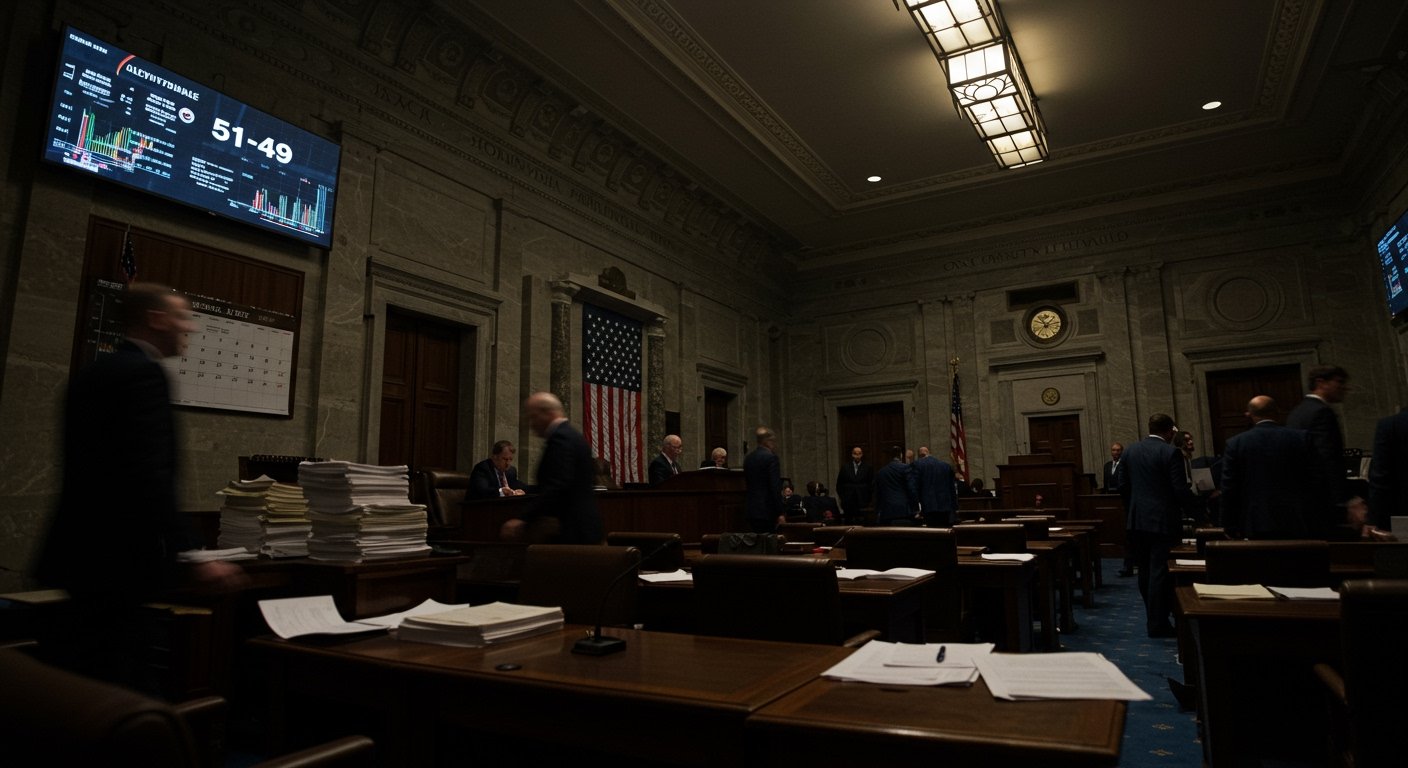Washington D.C. – The United States Senate has narrowly cleared a critical procedural hurdle, advancing President Donald Trump’s sweeping legislative package encompassing significant tax breaks, spending cuts, and bolstered funding for deportation efforts. The vote, held in a late Saturday session, marks a pivotal moment for Republicans aiming to secure passage of the bill before the symbolic July Fourth deadline.
The motion to proceed with the legislation passed by a slim 51-49 margin. Vice President JD Vance was present during the crucial vote. The Saturday session saw hours of intense negotiations as Republican leadership worked to secure the votes of holdout senators who had expressed reservations or demands regarding the bill’s contents.
Senate Vote Highlights Divisions
The 51-49 tally underscores the deep divisions within the Senate and the challenges Republicans face in uniting their caucus behind the comprehensive package. All Democrats present voted against the motion to proceed. They were joined by two Republican senators who voiced opposition, although their specific reasons for dissent at this procedural stage were not immediately detailed.
The bill faces further opposition in the House of Representatives, with California Representative David Valadao explicitly noted as being against the measure.
Core Components of the Legislation
At the heart of President Trump’s legislative agenda lie substantial tax breaks, estimated to total approximately USD 3.8 trillion. These tax cuts are a central feature of the proposed bill, intended, according to proponents, to stimulate economic growth and investment.
However, the package is not solely focused on tax reduction. It also includes significant spending cuts across various government programs. Furthermore, it allocates bolstered funds specifically designated for deportation initiatives, aligning with the administration’s immigration enforcement priorities.
Internal GOP Disagreements Surface
The proposed spending reductions have exposed fissures within the Republican party. Disagreement persists among some GOP lawmakers regarding the extent and nature of cuts, particularly concerning vital social safety net programs.
Specific programs mentioned in the context of potential reductions include Medicaid, the federal health insurance program for low-income individuals and families, and food stamps, which provide assistance for purchasing food. The debate centers on whether these cuts are necessary or justifiable, especially when intended to offset the substantial cost of the tax breaks included in the bill.
The White House Stance and Political Deadline
The White House has issued strong statements of support for the legislative package. Administration officials have characterized the bill as implementing critical aspects of President Trump’s policy agenda, emphasizing its potential impact on the economy and national priorities.
The target of passing the bill by the July Fourth holiday underscores the political urgency surrounding the legislation. Achieving this milestone would represent a significant legislative victory for President Trump and the Republican party, allowing them to present a major policy achievement to the American public ahead of future elections. However, the narrow margin of the Senate vote and the visible disagreements suggest the path to final passage may still face considerable obstacles.
External Critiques Emerge
Beyond the political arena, the bill has also drawn sharp criticism from prominent figures outside government. Billionaire entrepreneur Elon Musk has publicly denounced the package in unusually strong terms.
Musk described the bill as “utterly insane and destructive” on a public platform. He further contended that the proposed legislation would have severe negative consequences for the economy, claiming it will “destroy millions of jobs.”
Such high-profile criticism from a figure like Musk adds another dimension to the public debate surrounding the bill, highlighting concerns about its potential economic fallout from perspectives outside traditional partisan lines.
Outlook for Passage
While the Senate’s procedural vote clears a necessary hurdle, the bill’s journey through Congress is far from over. It must navigate potential amendments, further debates, and ultimately, a final passage vote in both the Senate and the House.
The divisions within the Republican party, coupled with unified Democratic opposition and external criticism, indicate that securing final legislative approval, especially by the ambitious July Fourth deadline, will require continued negotiation and political maneuvering by the White House and Republican leadership.



















